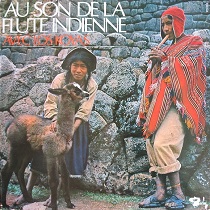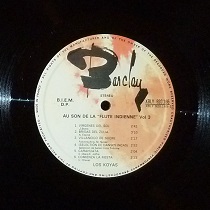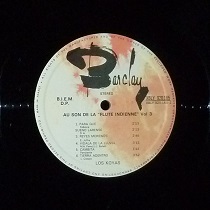


Los Koyas
Au Son De La Flute Indienne Vol. 3
The 'Los Koyas' folk music group:
In the Inca Kingdom the name of 'Koya' was given to the Princesses of Royal Blood.
In Bolivia there still lives a race of 'Colla' or 'Koya' Indians. On this record the 'Koyas' transmitt to us all the mystery and magic of Indian music.
(Barclay 920 165 – Made In France – Circa 1970)
A
1.
Virgenes Del Sol
(J. Bravo)
This music characteries the Peruvian dances born of the Inca tradition.
2.
Brisas Del Zulia
(Amable Espina)
Among the folk tunes, the waltz is played in different contries of the Andean Cordillera. However in each country it has its own style and colour. This one, of Venezulean origin, offers in addition to its fundamental nature, the particularity of being accompanied by the harp, the guitar and the 'cuatro', a small guitar with four strings, from which it derives its name.
3.
Villancico De Sucre
(Folklore / Arrg. M. Nunez)
The 'villancico' is a piece of music played or sung at Christmas time.
4.
Seleccion De Bailes Incas
(Seleccion de bailes Incas Folklore)
The 'Koyas' present different rhythms of Incan dances, perpetuated through the centuries and still alive in Peru.
5.
Carahuata
(O. Otero / E. Joffre)
This music, with the 'huayno' rhythm, characterizes the dances of the high plateaux of Bolivia.
6.
Comienza La Fiesta
(Ulpiana Chavez)
This title, 'The Celebration Begins', expresses the gay and colorfull 'sanjuanito' rhythm well. However Equadorian music, because of the dense Indian population, is differentiated more especially by its slow melancholy accents.
B
1.
Para Que
(Folklore)
This rhythm, known in Chili by the name of 'cueca', is played in various countries and changes its name according to its origin. Sometimes it is accompanied by guitars or the 'charango' or 'charanguito' according to its size, a very original instrument made with the shell an armadillo.
2.
Sueno Larense
(D. A.)
Harp and 'kena' (Indian flute) bring to this other Venezuelian waltz the musical colour of that country.
3.
Reyes Morenos
(E. Joffre)
This title of Bolivian origin, is a 'villancico' played for the Christmas holidays.
4.
Vidala De La Luvia
(M. A. Perez / J. J. Batelli)
The 'vidalas' are Indian songs strongly markede by the religious mysticism of the Incas. Thus this 'vidala' is an invocation for the rain to come, whence its name.
5.
Cambita
(Pendiente)
This is the name given by the Indians to the woman they love. This music, of Bolivian origin, is also a traditional dance.
6.
Tierra Adentro
(L. Crespo)
Music descriptive of the 'interior lands' of Ecuador.